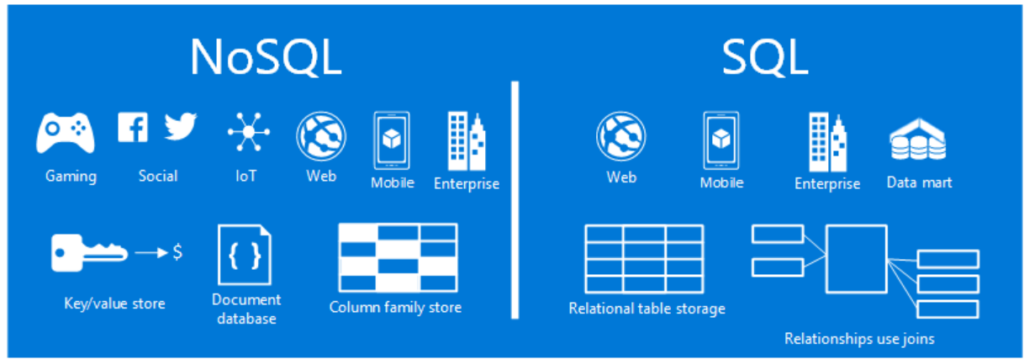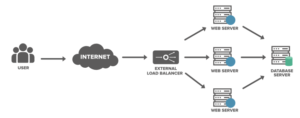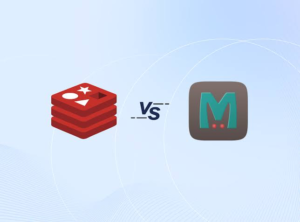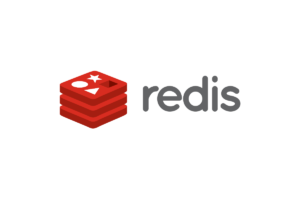
Introduction
In the world of databases, two prominent paradigms emerge: SQL (Structured Query Language) databases and NoSQL (Not Only SQL) databases. Each paradigm addresses different data storage and retrieval needs, and understanding their differences can help you choose the right database system for your specific requirements.
What is SQL Databases
SQL databases are based on the relational database management system (RDBMS) model. They have been around for several decades and are known for their structured approach to data storage. SQL databases use tables to organize and store data, where each table consists of rows and columns. The relationships between different tables are defined through keys, such as primary keys and foreign keys. The primary language used to interact with SQL databases is SQL, a standardized query language for managing and querying relational data.
Key characteristics of SQL databases
- Structure : Data is stored in a structured format with predefined schemas.
- Data Integrity : SQL databases enforce data integrity through constraints like primary keys, unique keys, and referential integrity.
- ACID Compliance : ACID (Atomicity, Consistency, Isolation, Durability) properties ensure data consistency and reliability.
- Transactions : SQL databases support transactions, which enable multiple operations to be grouped and executed as a single unit of work.
- Scalability : Traditional SQL databases may have limitations in scaling horizontally for large-scale applications.
What is NoSQL Databases
NoSQL databases emerged as a response to the limitations of traditional SQL databases, especially when dealing with large volumes of unstructured or semi-structured data. NoSQL databases offer a more flexible and dynamic approach to data storage and retrieval. They come in various types, including document stores, key-value stores, column-family stores, and graph databases. NoSQL databases often prioritize scalability and performance over strict data consistency.
Key characteristics of NoSQL databases
- Flexibility : NoSQL databases allow for dynamic and schema-less data storage, making them suitable for handling diverse and evolving data types.
- Scalability : Many NoSQL databases are designed for horizontal scaling, making them well-suited for handling large amounts of data and high traffic.
- Data Models : Different NoSQL databases use various data models, such as key-value pairs, JSON-like documents, columnar storage, or graph structures.
- Eventual Consistency : NoSQL databases might prioritize availability and partition tolerance over strict consistency, leading to eventual consistency models.
- Performance : NoSQL databases can achieve high-performance levels due to their design choices and optimized data access patterns.
Choosing between SQL and NoSQL
Choosing between SQL and NoSQL databases depends on various factors related to your project’s requirements, data characteristics, and performance needs. Here are some key considerations to help you make an informed decision:
Data Structure and Complexity
- If your data has a well-defined, structured schema with complex relationships, SQL databases are a better fit. They excel at managing structured data and enforcing data integrity through relationships.
- If your data is diverse, unstructured, or semi-structured, NoSQL databases offer more flexibility. They allow you to store and query data without a rigid schema, making them suitable for applications with evolving data models.
Scalability
- If your application is expected to experience high growth in terms of data volume or traffic, NoSQL databases often provide better horizontal scalability. They can distribute data across multiple nodes or clusters, accommodating increased load more effectively than many traditional SQL databases.
- SQL databases can scale vertically (by upgrading hardware) or through sharding, but it might involve more complex management.
Performance
- If your application requires high-performance reads and writes on large datasets, NoSQL databases can often provide better performance due to their optimized data access patterns and distributed nature.
- SQL databases might be more suitable for complex queries involving multiple tables and relationships.
Consistency and Transactions
- If maintaining strong data consistency (ACID properties) is crucial for your application, SQL databases are designed with these principles in mind. They ensure data integrity even in the face of concurrent transactions.
- NoSQL databases might provide eventual consistency, which sacrifices strict consistency for improved availability and partition tolerance.
Query Flexibility
- If your application requires ad-hoc queries and complex aggregations, SQL databases offer powerful query languages (SQL) for such operations.
- NoSQL databases provide specific query languages or APIs tailored to their data models. While they might lack the full expressive power of SQL, they can still handle many types of queries efficiently.
Development Speed and Flexibility
- If your project requires rapid development and iteration, NoSQL databases can be advantageous due to their schema-less nature and flexible data storage.
- SQL databases might involve more upfront schema design and potentially slower development cycles.
Ecosystem and Community
- SQL databases have a long-standing history and a mature ecosystem with a wide range of tools, libraries, and resources.
- NoSQL databases offer diverse options, each with its own strengths, but the ecosystem might be less standardized and more specialized.
Specific Use Cases
- SQL databases are well-suited for applications like financial systems, content management, and e-commerce, where data integrity and complex queries are essential.
- NoSQL databases are often preferred for applications like social media platforms, real-time analytics, Internet of Things (IoT), and applications dealing with rapidly changing data.
The choice between SQL and NoSQL depends on your project’s specific requirements. If you have well-defined and structured data with complex relationships, and you require strong data consistency and integrity, an SQL database might be a better fit. On the other hand, if you are dealing with diverse, rapidly evolving, or unstructured data, and require high scalability and performance, a NoSQL database could be more suitable.
Ultimately, the decision should be based on factors such as the nature of your data, the expected workload, scalability needs, and development preferences. It’s worth noting that hybrid approaches also exist, combining aspects of both SQL and NoSQL databases to leverage the strengths of each paradigm.
Conclusion
In conclusion, the choice between SQL and NoSQL databases is a critical decision that should be based on your project’s unique requirements, data characteristics, and performance needs. Here’s a summarized overview to help you make an informed decision:
Choose SQL Databases If:
- You have well-defined, structured data with complex relationships.
- Data integrity, consistency, and ACID properties are paramount.
- Your application involves complex queries and aggregations.
- Strong transaction support is essential.
- Your project benefits from a mature ecosystem with standardized tools.
- You need a reliable and established solution for traditional use cases like financial systems or content management.
Choose NoSQL Databases If:
- Your data is diverse, rapidly changing, unstructured, or semi-structured.
- Scalability and performance are top priorities, especially for large volumes of data and high traffic.
- You value flexibility and agility in data modeling.
- Your application needs to handle real-time analytics, IoT, social media, or other dynamic scenarios.
- You are willing to trade strict consistency for improved availability and partition tolerance.
- You’re comfortable exploring a more varied and evolving ecosystem of database options.
Remember that the choice between SQL and NoSQL isn’t necessarily an exclusive one. Many modern applications adopt a polyglot persistence approach, using both SQL and NoSQL databases as needed to address different aspects of their data storage and retrieval requirements.
Ultimately, your decision should be well-informed and align closely with your project’s goals, technical constraints, and the trade-offs you’re willing to make to achieve the desired balance between data structure, consistency, scalability, and performance. It’s advisable to thoroughly evaluate both options and, if possible, prototype and benchmark to determine which database type best suits your specific needs.



